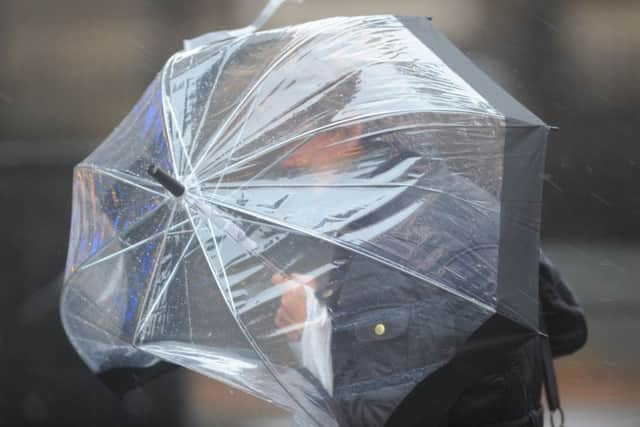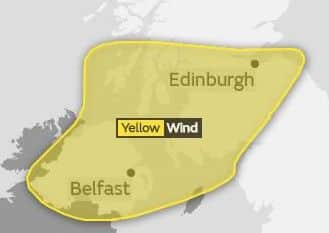Storm Dylan set to batter Scotland with wind and rain on Hogmanay
Storm Dylan is forecast to sweep in from Ireland to lash southern Scotland early on Hogmanay - although the winds should subside in time for the bells.
The fourth named storm of the winter prompted the Met Office to issue a yellow - “be aware” - severe weather warning from midnight to 3pm tomorrow for an area south from Fife.


Advertisement
Hide AdAdvertisement
Hide AdA spokesperson said: “Some very strong winds are possible across Northern Ireland and then southern Scotland on New Years Eve, with the potential for gusts of 70-80mph in some places.
“There is a small chance of damage to buildings, such as tiles blown from roofs, with the potential for injuries and danger to life from flying debris. Large waves and beach material being thrown onto coastal areas could also be a hazard.
“There is a small chance of longer journey times or cancellations as road, rail, air and ferry services are affected, with the chance that some roads and bridges could close.


“Power cuts and other services such as mobile phone coverage may be affected.”
Steve Ramsdale, chief forecaster for the Met Office, added: “Unsettled weather looks likely to continue through the first week of January with further bouts of milder wet and windy weather interspersed with colder bright but showery periods.”
CalMac has suspended some west coast ferry sailings today because of winds expected to gust to 46mph, including on the Islay-Colonsay-Oban route.
The rise in temperatures is expected to follow the end of an overnight ice warning for most of Scotland, apart from the far north and south west, at noon today.


It included up to a further 3cm of snow on high ground from the Central Belt north.
Advertisement
Hide AdAdvertisement
Hide AdYesterday’s snowfall halted flights at Glasgow Airport for nearly an hour.
It also led to McGill’s Buses suspending all services in Inverclyde for a time.
Dozens of snowploughs and gritters battled to keep major routes open.


At the Rest and Be Thankful pass on the A83 in Argyll, there were temporary lane closures to clear the road and free heavy lorries stuck in the snow.
The official Traffic Scotland information service also reported delays because of heavy snow on the A78 on the Clyde coast and the A737 south west of Paisley.
Police also said the A713 at St Johns Town of Dalry in Dumfries and Galloway was closed, with several vehicles stuck in the snow amid “very icy” conditions.
Overnight, the Met Office measured 5cm of snow in Altnaharra in the Highlands, 4cm in Drumalbin, South Lanarkshire, while Bishopton in Renfrewshire had 2cm by 8am.
CalMac sailings were disrupted including between Oban and Mull.
Advertisement
Hide AdAdvertisement
Hide AdSouth of the Border, Cumbria Police said all routes in the south of the county were affected, as well as the M6.
The AA said the worst areas on the roads were around Manchester and Cumbria, and the A6 in Cumbria, the Snake Pass and several roads around Macclesfield were closed.
The RAC was “very busy”.